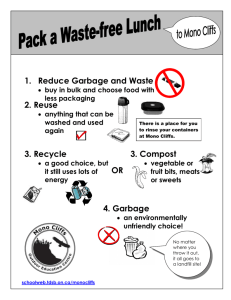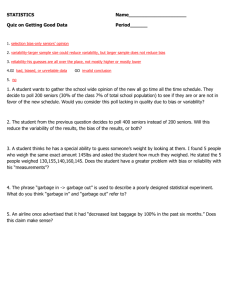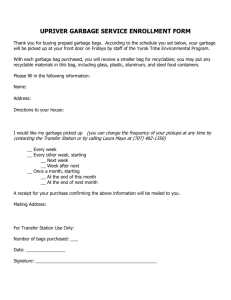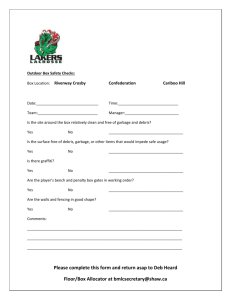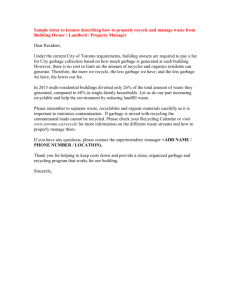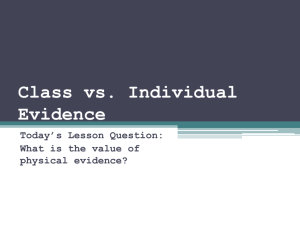The Lifestyle Project
advertisement
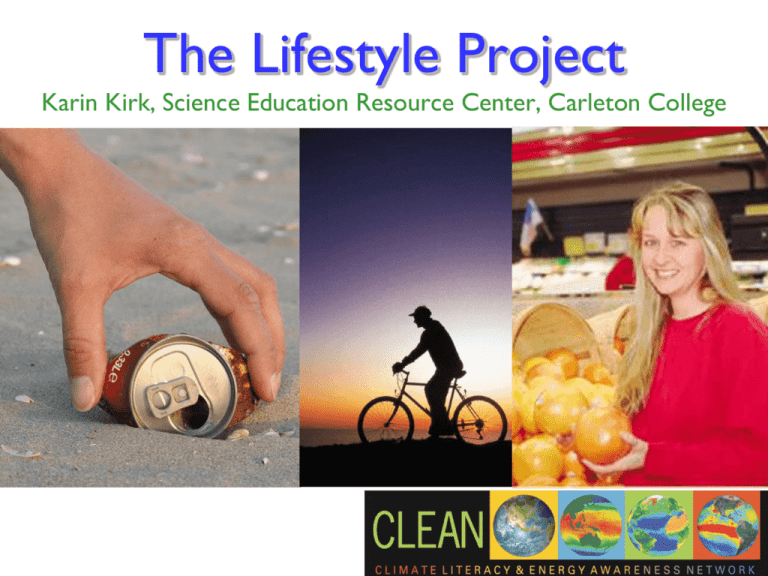
The Lifestyle Project Karin Kirk, Science Education Resource Center, Carleton College the Science Education Resource Center at Carleton College SERC Purpose Challenge students to take the energy conservation concepts they’ve learned in class and apply them to their own life. Poll Which of these have you done today? A. Driven your car/truck B. Taken a hot shower C. Eaten meat D. Thrown something in the garbage E. Computer/gadget use F. (I know there is no F) All of the above Poll Which of these have you not done today? A. Driven your car/truck B. Taken a hot shower C. Eaten meat D. Thrown something in the garbage E. Computer/gadget use Poll What is the largest use of energy in your lifestyle? A. Driving B. Home heating and cooling C. Air travel D. Eating meat E. Computer/gadget use Project Goals I want students to be able to... • Develop a quantitative sense for how much energy is used during everyday tasks. • Understand the linkages between food production, waste output, water use and energy consumption. • Take on a personal challenge to reduce their energy use. • Learn effective methods to reduce energy use. • Come away from the project with a lasting impact. How does the project work? 4 weeks long: 1 week baseline, 3 weeks of action Introduction and baseline – Begin with an activity that allows students to understand their personal environmental footprint. (no sermons) – Baseline measurements of personal energy use Techniques include: – – – – – Footprint calculators Mock town hall meeting Eco-quiz Excel spreadsheets Kill-a-watt meters Students need to be ready for a challenge. Weeks 2-4: The Challenge Students select 3 categories from 7 possible choices • Heat • Garbage • Electricity • Water • Car • Food • “Create your own” • For each category the rules are clearly defined. • Each week the project becomes more rigorous, because students will have to meet the requirements more frequently. • Students keep track of their activities in a journal, which is turned in weekly. Number of “project days” increases each week Week 1 - baseline Week 2 - 2 days per category Week 3 - 3 days per category Week 4 - 4 days per category Each student turns in a journal at the end of each week. The categories 1. TURN DOWN THE HEAT Lower the thermostat by 3 degrees each week. This option is limited to those who have control over their own thermostats and who have cooperative housemates! “My thermostat is usually set at 85 degrees because I am from Florida.” “I have finally gotten my housemates to cooperate and stop turning up the heat. I think they are starting to get the point!” 2. NO GARBAGE Spend each project day producing no waste that would end up in a landfill. Students quickly find themselves analyzing every move they make, which is simultaneously frustrating and enlightening. They begin to realize that many everyday tasks result in waste being produced and they need to find alternatives. “It seems impossible to not produce garbage for even one day. At first it didn’t sound like a big deal, but after trying it for just this first day I realized just how much garbage I normally produce! It’s embarrassing!” “Our family is about to begin our third week using the same thirteen-gallon garbage bag.” 3 and 4. CONSERVE ELECTRICITY AND WATER Students aim to reduce electricity and water consumption by 50%. You may find yourself amazed by the lavish energy use of your students prior to the project. “I usually take two 20 minute showers a day” “I leave Christmas lights on in my room most of the time because I don’t like coming home to a dark room.” “When I went home for break I went around the house turning off the lights and my Dad just about fell over. He said he’s been yelling at me all my life to stop leaving lights on and now I was reminding him to turn them off!” 5. LEAVE THE CAR AT HOME Students must not drive their cars on each of their project days. Instead they discover other options like riding the bus, walking, riding their bikes, or simply planning ahead to reduce the need to drive daily. “Transportation is a big thing in my life…I love my car and I drive everywhere.” “Between walking to class and not eating hamburgers, I’ve lost 7 pounds during this project. My girlfriend is psyched!” 6. EAT EFFICIENTLY For each project day students adopt a vegetarian diet. Students who are already vegetarians or nearly so can take it a step further and eat locallyproduced, organic, or vegan foods. “Oh my God I ate a veggie-burger! If my housemates saw me do this, I would never hear the end of it.” Poll If you really had to, by how much could you reduce your energy use? A. 5% or less B. 10% C. 20% D. 50% E. More than 50% Poll If they really had to, by how much could your average student reduce their energy use? A. 5% or less B. 10% C. 20% D. 50% E. More than 50% Assessment via Journals • Students make one entry for or each day they participate in project activities, keeping track of what they do in each of their three categories. • Journals are turned in weekly and are quickly returned to the students so that they can receive guidance on their efforts. • Weekly “embedded” homework questions can be assigned and the students put the answers into their journal for that week. • Additional interaction can be set up via a course discussion board. Sudden self-awareness… “Today is my first day on the project. I was unprepared for the immediate affect on my daily routine, but it had a big impact. Each time I went to do something, I had to think of how my actions would affect the environment.” Old habits breaking… “Throughout the day, I resisted the urge to habitually turn on the hot water to wash my hands, which proved harder to remember than I thought. I kept turning the hot water on and then off again once I realized what I had done.” Newfound awareness… I am trying to learn more and more everyday how I can continue the changes I have made, and I want to make more! ...It is really not that hard, it just takes a little attention and some dedication. A compounding impact... My roommate was definitely not thrilled when I kept gently reminding her to turn off lights or the TV when she wasn’t using them, but by the end she started to make the changes on her own, which was encouraging. Does it “stick?” Has your lifestyle changed in any permanent ways since the Lifestyle Project? Yes 81% No 19% Skidmore College survey, 1996 “I find it painfully ironic that a class I took only to fulfill the science requirement will have a stronger impact on how I actually live my life, day to day, than any other class I’ve taken.” Pedagogic Benefits • Employs Kolb’s experiential learning theory (Kolb, 1984) • Connects theoretical to practical to personal (and vice versa) • Incremental and iterative nature allows for repeated practice of new behaviors • Contains a quantitative component • Journal process can be metacognitive • Presents an alternative type of learning experience • Can allow for closer connection within the class and with instructor. Environmental Benefits • Typical energy savings per student = 1-2 million BTU per day (300-600 KWh per day) x 9 days • Dramatic shift in students’ personal awareness of their resource use and understanding of the repercussions of resource use. • New behaviors are likely to continue after the project is complete. • National implementation of easily achievable household energy savings can save 20% of household CO2 emissions, or 7.4% of US national emissions (Dietz et al, 2009, PNAS). Attitudinal Benefits Source: The Harris Poll of 2,303 adults surveyed online between November 2 and 11, 2009 by Harris Interactive. Source: Global Warming’s Six Americas 2009. Maibach, Roser-Renouf, and Leiserowitz, 2009 Pedagogic Considerations • Journal assessment is very qualitative, rubrics help. • Set up is important - students needs to be in a frame of mind to take on a challenge • Requires dedication from instructor to frame the project and to inspire and motivate for 3 weeks. • Grading journals is time-consuming, yet wonderful. • Some students may be less than honest. http://serc.carleton.edu/introgeo/enviroprojects/lifestyle.html http://serc.carleton.edu/introgeo/enviroprojects/lifestyle.html “I am so aware now that I cringe when I see lights on that shouldn’t be, and when people take more napkins than they need. Will I always be like this?”
